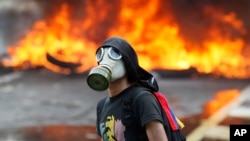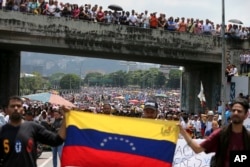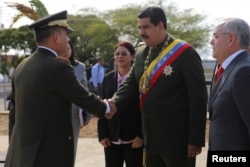Anti-government activists in Venezuela blocked thoroughfares in the capital and several other cities Monday, continuing a fourth week of street demonstrations to press leftist President Nicolás Maduro for new national elections.
“We reiterate again: Only through the vote will we get all Venezuelans to decide what future they want for the country,” Julio Borges, president of the opposition-led National Assembly, told demonstrators gathered at Plaza Brion de Chacaito in eastern Caracas.
A toppled street light stretched across several lanes of a highway in Caracas' Santa Fe district, with scores of demonstrators sitting or standing nearby. At other intersections, activists some dressed in the yellow, red and blue of Venezuela's flag piled garbage to obstruct traffic.
'This government has fallen!'
According to Reuters news service, some passed time by playing cards, occasionally chanting, “This government has fallen!”
Hundreds of police and National Guard troops took up positions at several points in the city, riot gear at the ready. Security forces have used tear gas, and sometimes rubber bullets, in previous skirmishes with protesters.
At least two people were killed at protests in other parts of the country Monday, bringing the nationwide death toll to at least 23 since early April, with hundreds more injured.
Maria Corina Machado, an opposition leader and former National Assembly lawmaker, implored demonstrators to keep up the pressure. “All over the democratic world today, their eyes must be on the jails of our country.”
Human rights groups have said more than 1,000 people were detained during recent disturbances and over 700 are still in detention.
Maduro backs some elections
Maduro, in his weekly television address Sunday, endorsed voting later in the year for mayoral and gubernatorial posts. He said nothing about moving up elections for the presidency. His term expires in late 2018.
While the president urged his political opponents to join in a “political dialogue for peace,” he also called upon his followers to support the “Bolivarian revolution” and “the security forces and public order.”
“They are responsible for all the violence, all the dead, all the damage,” Maduro said of activists demonstrating against him.
In contrast, opposition MP José Guerra urged the national armed forces to control groups known as “armed groups” because “they are creating a state of ungovernability in Venezuela. “They are going to hold us all responsible for what happened — the dead, looting — which they themselves promoted,” Guerra warned.
The opposition blames the government for the unraveling of Venezuela's once-booming economy which has left the country with shortages of food, medicine and other basic goods.
More bad economic news
On Monday, a United Nations commission forecast the country's economy would contract by another 7.2 percent this year, Agence France-Presse reported.
Venezuela's near-daily protests were sparked by the Supreme Court's attempt in late March to wrest legislative powers from the opposition-dominated Congress. The court reversed that decision following domestic and international outcries demanding separation of powers and a return to democracy.
But tensions ratcheted up when Venezuela's government then barred opposition leader Henrique Capriles — twice a major presidential candidate — from running for office for 15 years.
The 44-year-old Capriles, currently governor of Miranda state, which surrounds Caracas, is one of the most recognizable leaders behind the protest movement that has been roiling the country for weeks.







